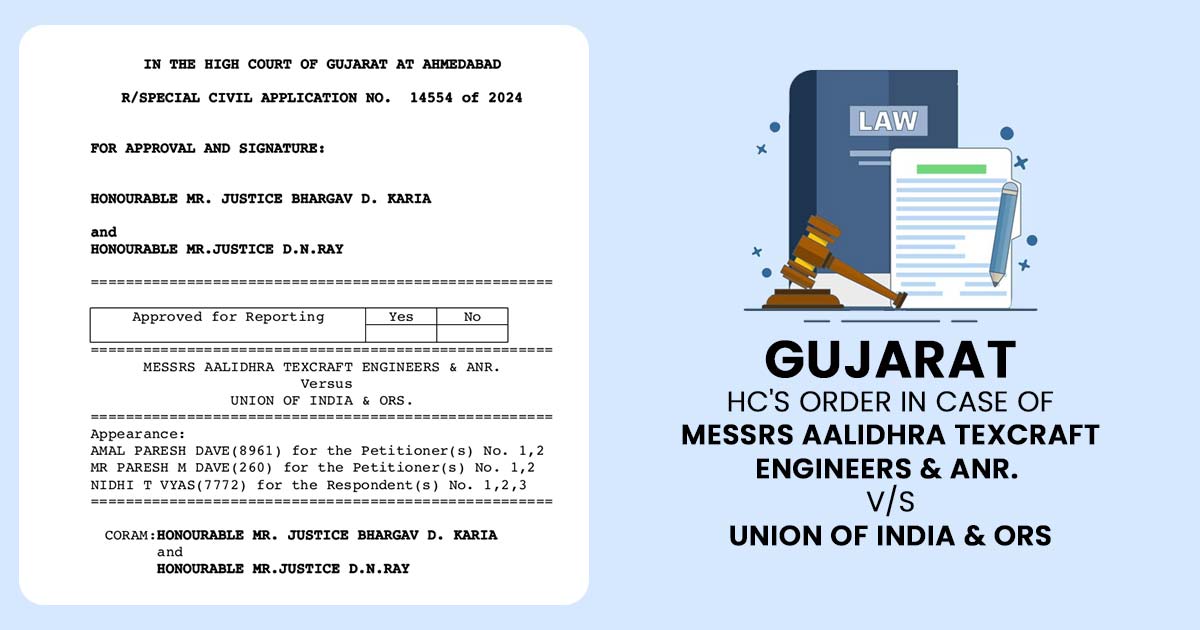
The bench of Justices Bhargav D Karia and D N Ray, quoting Joshi Technologies International and Gujarat State Police Housing Corporation stated that amounts filed via mistake or ignorance cannot be retained by the Revenue.
The applicant is in the manufacturing of textile machinery and equipment and is registered under the GST Act, 2017. The applicant from May 2019 to March 2020, imported various inputs and materials, filing 33 Bills of Entry and paying import duties, including an integrated tax of Rs 2,48,28,300, which was claimed as an Input Tax Credit (ITC).
Read Also: How to Maintain Input Tax Credit Ledger By Gen GST Software
The applicant assuming that there was an excess credit of Rs 4000000 as of the mismatch between GSTR-2A and GSTR-2B, has deposited the amount dated November 13, 2020, through Form DRC-03. However, it was because of the error in the system and not the reason that the applicant had mistakenly taken the credit.
The audit performed in January-February 2024 disclosed that no additional obligation was there for FY 2019-20. The applicant cited the mistake and applied for a refund of 40,00,000 dated March 30, 2024.
The respondent authorities have closed the case through Form GST ASMT-12, they subsequently issued a notice dated May 29, 2024, asking to reject the refund due to the time limitations u/s 54(1) of the GST Act, which defines a two-year limitation period.
The Assistant Commissioner even after oral clarifications has rejected the refund dated June 14, 2024, quoting the delay. A writ petition has been filed by the applicant claiming that the deposit was voluntary and not a tax recovery which makes the period of limitation non-applicable.
The bench cited the Supreme Court judgment in Salonah Tea Company Ltd. Etc. v. Superintendent of Taxes Now-gong and Ors. etc, it was said that “Normally in a case where tax or money has been realized without the authority of law, the same should be refunded and in an application under Article 226 of the Constitution the court has power to direct the refund unless there has been avoidable laches on the part of the petitioner which indicate either the abandonment of his claims or which is of such nature for which there is no probable explanation or which will cause any injury either to the respondent or any third party. It is true that in some cases the period of three years is normally taken as a period beyond which the court should not grant relief but that is not an inflexible rule.”
The HC as per that has asked the department to allot the amount deposited by mistake. However, it was mentioned that the applicant would not be qualified for any interest.
It was noted that “when the petitioner has deposited voluntarily the amount of Rs. 40,00,000/-, the same would not be covered by the provisions of Section 54 of the GST Act and the same is required to be refunded by the respondent authorities as the same could not have been rejected on the ground of limitation under Section 54(1) of the GST Act.”
| Case Title | Messrs Aalidhra Texcraft Engineers & ANR. vs. Union of India & ORS |
| Citation | 14554 of 2024 |
| Date | 12.12.2024 |
| Counsel For Appellant | Amal Paresh Dave (8961) Mr Paresh M Dave (260) |
| Counsel For Respondent | Nidhi T Vyas (7772) |
| Gujarat High Court | Read Order |









